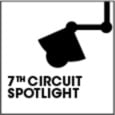Seventh Circuit Sets Guardrails for Amicus Briefs
Rule 29 does not define the circumstances in which a court will grant leave to file an amicus brief. Seventh Circuit Rule 29 likewise, does not provide that guidance.
April 05, 2021 at 10:46 AM
5 minute read
Federal Rule of Appellate Procedure 29 governs the filing of briefs amicus curiae. That rule permits the United States, a federal officer or agency, or a state to file an amicus brief. Any other party may file an amicus brief only with the consent of all parties to the appeal, or with leave of court. A motion for leave to file must identify the interest of the movant and state why the filing of the amicus brief is desirable. It must also disclose whether the party's counsel authored the brief in whole or in part or funded preparing the brief. Rule 29 does not define the circumstances in which a court will grant leave to file an amicus brief. Seventh Circuit Rule 29 likewise, does not provide that guidance.
 In Prairie Rivers Network v. Dynegy Midwest Generation, 976 F.3d 761 (7th Cir. 2020) (Scudder, J., in chambers), the Seventh Circuit, by Judge Michael Scudder, described the circumstances in which it will accept an amicus brief. The court explained an amicus brief is appropriate when it adds value to the Court's evaluation of the issues on appeal. The court recognized an amicus is likely an advocate, not a "neutral information broker." Nonetheless, an amicus interested in the outcome of the case can contribute to the court's consideration of the appeal. The court identified the following eight ways in which an amicus brief may assist the court:
In Prairie Rivers Network v. Dynegy Midwest Generation, 976 F.3d 761 (7th Cir. 2020) (Scudder, J., in chambers), the Seventh Circuit, by Judge Michael Scudder, described the circumstances in which it will accept an amicus brief. The court explained an amicus brief is appropriate when it adds value to the Court's evaluation of the issues on appeal. The court recognized an amicus is likely an advocate, not a "neutral information broker." Nonetheless, an amicus interested in the outcome of the case can contribute to the court's consideration of the appeal. The court identified the following eight ways in which an amicus brief may assist the court:
- Offering a different analytical approach to the legal issues before the court;
- Highlighting factual, historical, or legal nuance glossed over by the parties;
- Explaining the broader regulatory or commercial context in which a question comes to the court;
- Providing practical perspectives on the consequences of potential outcomes;
- Relaying views on legal questions by employing the tools of social science;
- Supplying empirical data informing one or another question implicated by an appeal;
- Conveying instruction on highly technical, scientific, or specialized subjects beyond the ken of most generalist federal judges;
- Identifying how other jurisdictions—cities, states, or even foreign countries—have approached one or another aspect of a legal question or regulatory challenge.
In doing so, the amicus brief must be "additive," offering something "different, new, and important." An effective amicus brief can be short. The court emphasized that "shorter is often better," while acknowledging that "it is more difficult to write a short, effective brief than a long, belabored brief." In Prairie Rivers Network, the court found the three proposed amicus briefs met the court's standard. While each brief contained some unnecessary repetition of the party's arguments, each brief provided unique perspectives on the question before the court. The court granted leave to file because "members of the court may find any or all of these additions helpful to deciding this appeal."
This content has been archived. It is available through our partners, LexisNexis® and Bloomberg Law.
To view this content, please continue to their sites.
Not a Lexis Subscriber?
Subscribe Now
Not a Bloomberg Law Subscriber?
Subscribe Now
NOT FOR REPRINT
© 2025 ALM Global, LLC, All Rights Reserved. Request academic re-use from www.copyright.com. All other uses, submit a request to [email protected]. For more information visit Asset & Logo Licensing.
You Might Like
View All
Hogan Lovells, Jenner & Block Challenge Trump EOs Impacting Gender-Affirming Care
3 minute read
DC Lawsuits Seek to Prevent Mass Firings and Public Naming of FBI Agents
3 minute read
Divided State Supreme Court Clears the Way for Child Sexual Abuse Cases Against Church, Schools

'Serious Legal Errors'?: Rival League May Appeal Following Dismissal of Soccer Antitrust Case
6 minute readLaw Firms Mentioned
Trending Stories
Who Got The Work
J. Brugh Lower of Gibbons has entered an appearance for industrial equipment supplier Devco Corporation in a pending trademark infringement lawsuit. The suit, accusing the defendant of selling knock-off Graco products, was filed Dec. 18 in New Jersey District Court by Rivkin Radler on behalf of Graco Inc. and Graco Minnesota. The case, assigned to U.S. District Judge Zahid N. Quraishi, is 3:24-cv-11294, Graco Inc. et al v. Devco Corporation.
Who Got The Work
Rebecca Maller-Stein and Kent A. Yalowitz of Arnold & Porter Kaye Scholer have entered their appearances for Hanaco Venture Capital and its executives, Lior Prosor and David Frankel, in a pending securities lawsuit. The action, filed on Dec. 24 in New York Southern District Court by Zell, Aron & Co. on behalf of Goldeneye Advisors, accuses the defendants of negligently and fraudulently managing the plaintiff's $1 million investment. The case, assigned to U.S. District Judge Vernon S. Broderick, is 1:24-cv-09918, Goldeneye Advisors, LLC v. Hanaco Venture Capital, Ltd. et al.
Who Got The Work
Attorneys from A&O Shearman has stepped in as defense counsel for Toronto-Dominion Bank and other defendants in a pending securities class action. The suit, filed Dec. 11 in New York Southern District Court by Bleichmar Fonti & Auld, accuses the defendants of concealing the bank's 'pervasive' deficiencies in regards to its compliance with the Bank Secrecy Act and the quality of its anti-money laundering controls. The case, assigned to U.S. District Judge Arun Subramanian, is 1:24-cv-09445, Gonzalez v. The Toronto-Dominion Bank et al.
Who Got The Work
Crown Castle International, a Pennsylvania company providing shared communications infrastructure, has turned to Luke D. Wolf of Gordon Rees Scully Mansukhani to fend off a pending breach-of-contract lawsuit. The court action, filed Nov. 25 in Michigan Eastern District Court by Hooper Hathaway PC on behalf of The Town Residences LLC, accuses Crown Castle of failing to transfer approximately $30,000 in utility payments from T-Mobile in breach of a roof-top lease and assignment agreement. The case, assigned to U.S. District Judge Susan K. Declercq, is 2:24-cv-13131, The Town Residences LLC v. T-Mobile US, Inc. et al.
Who Got The Work
Wilfred P. Coronato and Daniel M. Schwartz of McCarter & English have stepped in as defense counsel to Electrolux Home Products Inc. in a pending product liability lawsuit. The court action, filed Nov. 26 in New York Eastern District Court by Poulos Lopiccolo PC and Nagel Rice LLP on behalf of David Stern, alleges that the defendant's refrigerators’ drawers and shelving repeatedly break and fall apart within months after purchase. The case, assigned to U.S. District Judge Joan M. Azrack, is 2:24-cv-08204, Stern v. Electrolux Home Products, Inc.
Featured Firms
Law Offices of Gary Martin Hays & Associates, P.C.
(470) 294-1674
Law Offices of Mark E. Salomone
(857) 444-6468
Smith & Hassler
(713) 739-1250









